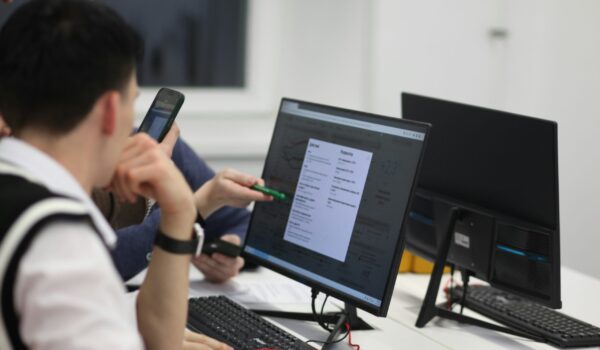
First Interview Success is Vital
 Interview success is about more than simply having the best resume. People who don’t have the best, or most qualified work history are selected over other, more qualified applicants all the time, simply because their first face-to-face meeting with an employer goes much smoother. Sometimes it comes down to the mood of the person interviewing you.
Interview success is about more than simply having the best resume. People who don’t have the best, or most qualified work history are selected over other, more qualified applicants all the time, simply because their first face-to-face meeting with an employer goes much smoother. Sometimes it comes down to the mood of the person interviewing you.
There are some externalities that you just can’t influence. If the person interviewing you is in the middle of an ugly divorce and just had a highly unpleasant phone call with their ex’s lawyer 15 minutes before sitting down with you, there is not much else to do other than accept your bad luck. It happens. But none of that is to say that you cannot do certain things that greatly improve your chance of success during your first meet-and-greet with your tentative new employer. If you are preparing for a job interview, or even if you just want to get a head start on job interview success, below are some things you should know.
Be honest, but don’t reveal too much
Believe it or not, most people respect authenticity. Even if you don’t profoundly connect with someone on an intellectual level, it is much easier to dislike a phony than someone who is forthright about who they really are. Being authentic is about having convictions and values and sticking to them. The interview is a chance for your employer to test and set traps for you that you may end up falling into. They might ask you difficult questions regarding what you would do in a certain situation, or ask you questions about your personality (e.g. what is something you need to work on?) because they are usually determining whether you are honest about what you would do.
This also means avoiding shooting yourself in the foot. If you are interviewing for a job that requires high-level analytical skills and attention to detail, and your employer asks you to recall a time when you made a mistake that was completely your fault, don’t talk about the time you completely misread the final exam schedule and showed up at 3:30 p.m. instead of 8:30 a.m. and had to beg for a rewrite. Also, don’t overshare personal information. Keep it entirely professional until you have had a chance to get to know someone better.
Interview success is about presentability
If ever there was a time to look as presentable as possible, it’s during your first (and every subsequent one as well) interview. Research shows that people make an indelible first impression on others within seconds. It is unfortunate, because the reality is we take quite a long time to really get to know someone, and often our first impressions of people turn out to be completely incorrect and uncharitable. But that doesn’t change the effect they have.
Part of the first impression process is evaluating a person based on how they look. Part of that comes down to their overall attractiveness, but in the world of business and bottom lines, people are generally looking for competence over attractiveness. However, there is a limit. Most job interviews, even for lower level jobs, require that you look well put-together. How you are dressed for a job interview says two things: it speaks to how serious you are taking this opportunity, and it speaks to the effort you are willing to put in. Both carry potential implications for how you conduct yourself and work as an employee.
Prepare, prepare, prepare
The worst thing you can do before a job interview is to go in with no preparation. Preparation means doing research on both the company you are applying to, as well as the person who is going to be interviewing you (if that information is available). Be able to talk at least somewhat intelligently about the organization, its past, its current and future projects, what the person, or team interviewing you has done professionally. Visit the company website and conduct some Google research before you sit down and start answering and asking questions.
It is also important to go over your responses to questions you will likely be asked. Many people are good at thinking on their feet, and speaking off-the-cuff, but not everyone. Having the outline of some of your responses memorized, or at least readily accessible can help immensely. It is, however, important not to come off as robotic, and your responses, canned. If you need help preparing for an upcoming interview or job application, there are services which can help you iron out your game plan and nail your first interview/meeting.
Be honest about your capabilities
The best thing you can be when it comes to what you are actually capable of is entirely honest. If your employer asks you what your Microsoft Excel capabilities are and you lie and say you are at an intermediate level when all you really know is the ‘sum’ formula, you are going to look and feel terrible when they ask you to create a macro for them and you have to Google “What’s an excel macro?”
This is especially important if this is your first serious employment after graduation, especially if it is in your field of study. Your employer understands you are young and inexperienced, they don’t expect you to have the kind of skills someone who has been doing the job for 5 years, even 1 year, has. If they ask you your opinion on something pertaining to the industry and the profession about which you are not able to speak somewhat intelligently, pass on the question. It’s better to respond with “I’m not sure I really have the experience, or the knowledge to comment on that yet.” Honesty and interview success go hand in hand.
Being interviewed, especially when a potential livelihood (and all the things that go with it) are on the line, can be very stressful. It can even prompt us to do and say foolish things we wouldn’t normally say. But nailing that first interview is about keeping your head, telling the truth without being over-revealing, and looking the part. If you have an interview lined up, and want to improve your chances of first interview success, keep the above considerations in mind, and for all other professional custom writing inquiries, get in touch with Homework Help Global.
References:
Morin, A. (2016). “There is a clear line between oversharing and being authentic — here’s how to avoid crossing it.” Forbes. Retrieved from: https://www.forbes.com/sites/amymorin/2016/10/22/there-is-a-clear-line-between-oversharing-and-being-authentic-heres-how-to-avoid-crossing-it/#119c42b56e3b
Wargo, E. (2006). “How many seconds to a first impression.” Association for Psychological Science. Retrieved from: https://www.psychologicalscience.org/observer/how-many-seconds-to-a-first-impression
Share:

